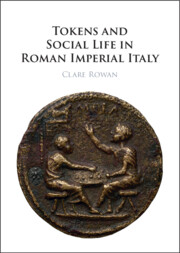Acknowledgements
This book is the product of the wonderful support given by the European Research Council and has been written as part of the project Token Communities in the Ancient Mediterranean, which received funding under the European Union’s Horizon 2020 research and innovation programme under grant agreement no. 678042. My sincere thanks are due to the wonderful intellectual environment provided by my fellow researchers on the project, Denise Wilding, Mairi Gkikaki and Antonino Crisà, as well as the fruitful discussions with Cristian Mondello as he conducted work on the tokens of late antiquity. I am particularly grateful for the collaboration we have formed, and the generosity of spirit in which everyone has shared data and photographs from various research campaigns.
Thanks are also due to all those who participated in the numerous conferences and workshops on tokens that have been held over the last few years: the multi-disciplinary Tokens: Culture, Connections, Communities at the University of Warwick in 2017, the Tokens, Value and Identity workshop at the British School at Rome in 2018, as well as the Tokens: The Athenian Legacy to the Modern World event at the British School at Athens in 2019. This book also owes a debt to all who gave feedback on various papers delivered on this topic over the years, as well as those who presented their own work on tokens in smaller settings (individual papers, smaller workshops, exchanges over coffees and drinks). Particular thanks are due to Yoav Farhi and our ongoing discussions over tokens found in Israel; Bill Dalzell, who found tokens as a topic well before I did; as well as Bernhard Woytek, Christina Kuhn and Jack Kroll for their sustained support and intellectual exchanges. I must also thank all those who participated in discussions and identification debates over Twitter. I also wish to thank the two readers of the manuscript, who have improved the final product. Any mistakes, of course, remain my own.
The book, and our knowledge of tokens, would not have been possible were it not for the support of various museums and their curators: thanks are due to the Münzkabinett in Berlin (particularly Bernhard Weisser and Karsten Dahmen) and the staff at the Altes Museum; the British Museum, Department of Coins and Medals (the entire staff, but especially Amelia Dowler, Richard Abdy, Vesta Sarkhosh Curtis, Henry Flynn, Eleanor Ghey, Helen Wang), and the Department of Greek and Roman Antiquities; the Ashmolean Museum (particularly Chris Howgego, Volker Heuchert, Jerome Mairat and also Denise Wilding for doing the photography); the Fitzwilliam Museum (Adrian Popescu for sending photographs of the tokens of the collection during lockdown); the Hunterian Museum (Jesper Ericsson for his hospitality and time); the Capitoline Museum (Maria Cristina Molinari); the Museo Archeologico Nazionale di Palestrina (Roberto Fatiganti and Roberto Darelli); the staff at archives and deposits at Ostia; Museo Nazionale Romano (Gabriella Angeli Bufalini); the BnF (especially Julien Olivier); the ANS (thanks to all staff and to Denise Wilding who spent a summer there); as well as the staff at Harvard University Art Museums (and especially Carmen Arnold Biucchi for her hospitality). The arrival of Covid-19 prevented exploration of further collections, but the campaign to that time had already furnished more material than I thought possible.
I must also thank the wonderful administrative staff at Warwick (Kymberley O’Hagan, Susan Doughty, Donna Davis, Gabrielle Grant, Colette Kelly, Perminder Dhesi) and at the British School at Rome, who helped me in more ways than I can list in terms of organising travel, expenses and access, and negotiating the challenges involved in running a large grant. My colleagues at the Department of Classics and Ancient History at Warwick are wonderful, and kept me afloat while I negotiated what was, at the time, a largely unknown field of research.
Finally, all my thanks to Richard Hassell, who shared a Covid-19 lockdown space with me during the writing period, and who ensured a ready supply of coffee, cake and fresh air was to hand.

